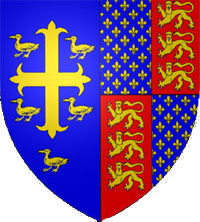 In considering Richard II and Richard II: Thomas of Woodstock we continue to struggle with the question: Which came first?
In considering Richard II and Richard II: Thomas of Woodstock we continue to struggle with the question: Which came first?
In the case of Richard II we know that the play was definitely written by August 29th, 1597, when it was entered into the Stationers’ Registry. (It was first published later that year.) Internal evidence has suggested dates ranging anywhere from 1592 to 1596 for its composition, but common consensus is that Shakespeare used The First Fowre Bookes of the Civil Warres by Samuel Daniels (written in 1594 and published in 1595) as one of his sources and conclude that the play was most likely written in 1595 or 1596.
For R2: Woodstock, we have no external evidence of a date. The style, genre, form, and even politics of the play have all been used to suggest a date in the late 1580’s or early 1590’s. (If you see a movie featuring primitive video games and the threat of nuclear war in a “ripped from the headlines of today†style, chances are you’re watching a movie from the early 1980’s.) More recently, however, a great deal of interest has been given to stylometric studies which attempt to pinpoint the play’s use of language in relation to general linguistic trends. (If you see a movie with people talking about bumping off the big cheese because he’s all wet, you’re probably watching a movie from before 1960.)
In 2001, Macd. P. Jackson published “Shakespeare’s Richard II and the Anonymous Thomas of Woodstock”, presenting a fresh stylometric study of the play which suggested that the play must have been written after 1600.
For example, Jackson looks at the number of feminine endings in the play (verse lines with 11 instead of 10 syllables):
Moreover, the percentage of feminine endings within blank verse lines would be thoroughly anomalous in a play composed around 1592 or 1593. Some basic data was meticulously accumulated by Philip W. Timberlake for his study entitled The Feminine Ending in English Blank Verse (1991), which covers plays 1580-95. […]
Timberlake shows that George Peele’s The Old Wives’ Tale is the only undoubted play by Robert Greene, Thomas Kyd, Thomas Lodge, John Lyly, Christopher Marlowe, Thomas Nashe, or George Peele, in which the percentage of feminine endings, on a strict count, rises about four, and in The Old Wives’ Tale it is only five. […] Most of the many anonymous plays yield single-figure percentages. Those with 10 percent or more are A Larum for London (10), Soliman and Perseda (10), King Leir (11), Alphonsus Emperor of Germany (11.5), John a Kent and John a Cumber (14), Jeronimo, Part 1 (19), Sir Thomas More (21), and Woodstock (21). […]
The high proportion of feminine endings in Woodstock — and the play is remarkably homogeneous in this regard — strongly suggests that the verse belongs to the seventeenth century, when many dramatists were making quite liberal use of this metrical variation.
Such arguments are meticulous. Unfortunately, many of Jackson’s conclusions are based on excluding Shakespeare’s work during the 1590’s specifically because his was the style which would later be widely imitated:
Only one play considered by Timberlake, namely Sir Thomas More, employs feminine endings as frequently as Woodstock, and only five others approach this rate, with percentages of fourteen or more. Three of the five are by Shakespeare, who is obviously not a candidate for the authorship of Woodstock.
In other words, 4 out of the 6 plays which contain such a high percentage of feminine endings pre-1600 were either contributed to or written by Shakespeare. Shakespeare was leading the pack, and if one considers Shakespeare to be a viable candidate for writing R2: Woodstock, then not only is the confidence of Jackson’s thesis badly damaged, but his research actually contributes substantially to a very different picture which is being painted by all of the evidence we’ve considered:
The Two Truths of the authorship of Richard II: Thomas of Woodstock.
Originally posted on September 17th, 2010.












